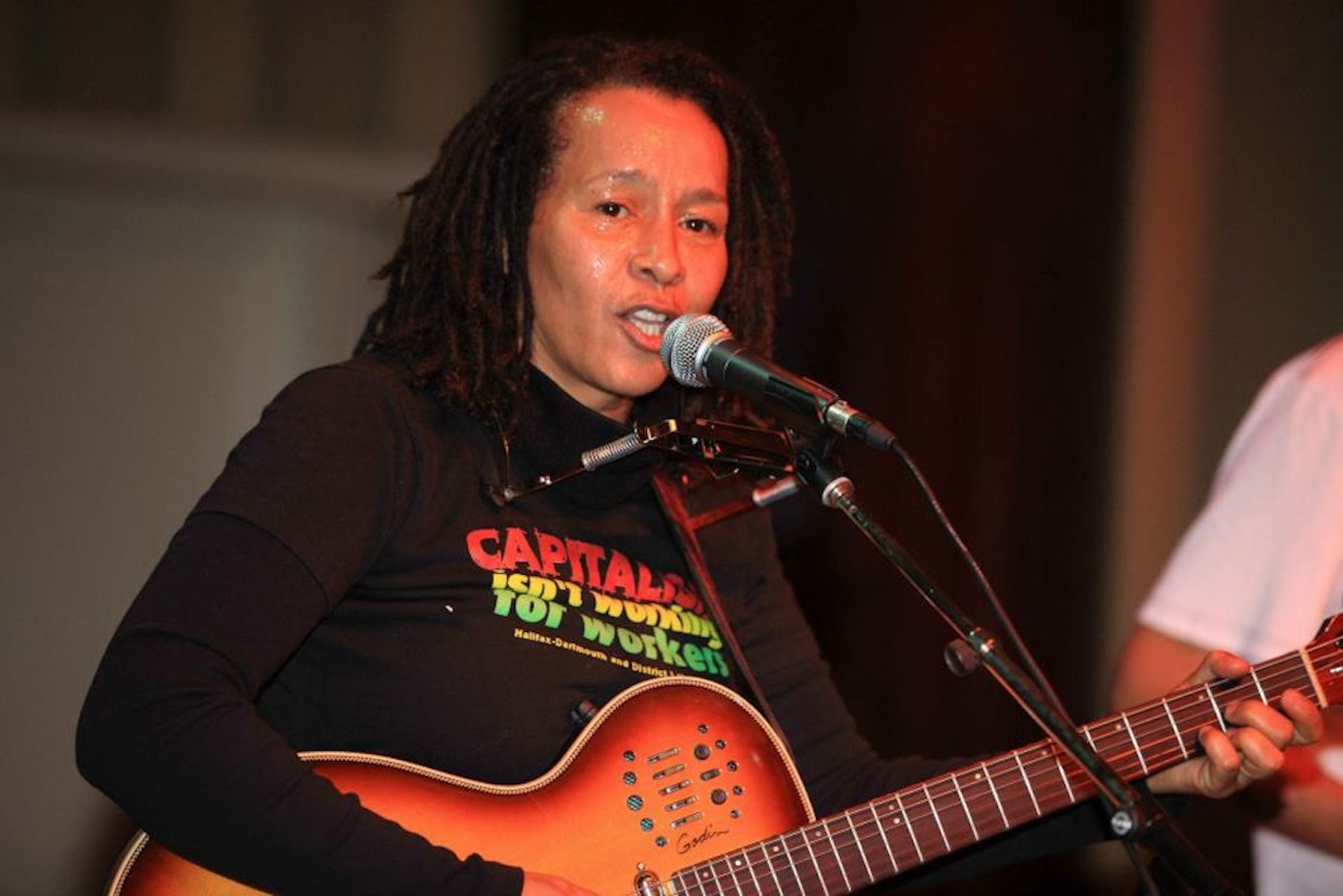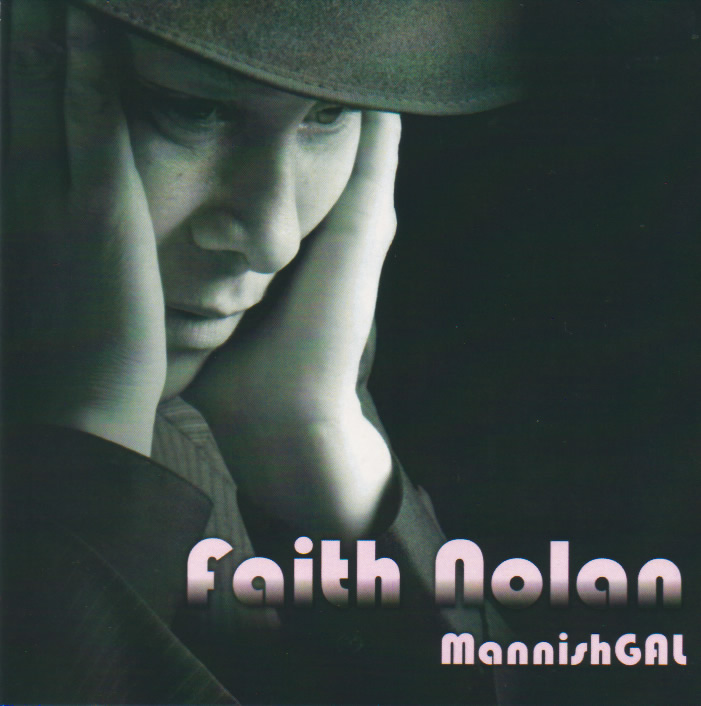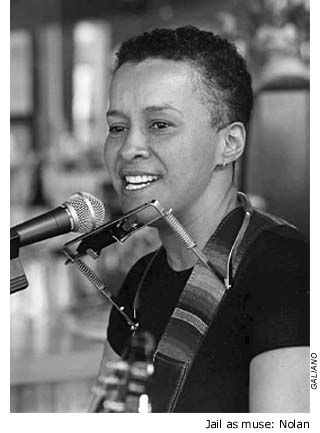"New and Improved SONG_Capitalism No! by Faith Nolan
Listen and enjoy the free song(S) below- Solidarity Yes!
Listen and enjoy the free song(S) below- Solidarity Yes!
Listen and enjoy, sing along to the free song(S)
-faith Nolan © 2014

This trembling dance I can hardly speak
My tongue is frozen from stelazine
Staggering shuffling I got a crazy walk
High on these drugs I can barely talk
Drug Corporation’s countin’cash, we need a healing better than that
Drug Corporation’s countin’cash, we need a healing better than that
Hospital jail doctors hears what they say
Mental health means take pills everyday
Keeps you quiet and you won’t complain
Crowd control and Billions are made
Drug Corporation’s countin’cash, we need a healing better than that
Drug Corporation’s countin’cash, we need a healing better than that
Children who run around making noise
Prescribed Ritalin little girls and boys
Growing up stoned their brain can’t grow
What will become of us who knows
Drug Corporation’s countin’cash, we need a healing better than that
Drug Corporation’s countin’cash, we need a healing better than that
Penitentiary where it’s
Drug Corporation’s countin’cash
Money money money where it’s
Student debt you get depressed
Lost your job your love life’s a mess
Not good enough you’re just a human being
You only get respect with bling, bling, and bling
Drug Corporation’s countin’cash, we need a healing better than that
Drug Corporation’s countin’cash, we need a healing better than that
Drug Corporation’s countin’cash, we need a healing better than that
Drug corporations’ countin’cash, we need a healing better than that
Penitentiary where it’s
Drug Corporation’s countin’cash
Money money, money, where it’s


MANNISH GAL
TRANS BLUES
NOT GOOD FOR A LONGTIME
NIGERIAN DAWN
METEWINTOQ
SINGING ON THE CORNER
JUST A LITTLE RAIN
VIOLA DESMOND
EVERYONE'S DIFFERENT
WE'VE GOT A RIGHT
BILLIE'S BLUES
WOMON IN THE WORLD
HOW. HIGH. EH
HAND ON THE PLOW
>> Activist Faith Nolan comes to Montreal to talk about women and prison
by SHANNON DEVINE
The growth of Canada's prison system may just be the nation's best kept secret. In the last decade the number of women behind bars has skyrocketed by 200 per cent, according the Elizabeth Fry Society, a pan-Canadian women-prisoners' rights group. Rights advocates have declared this trend the result of the feminization of poverty. Across the board, women of colour disproportionately fill the country's prisons for crimes that are often linked to economic survival: fraud, theft or drug trafficking.

Queer afro-Canadian musician and activist Faith Nolan sees this short trip from poverty to incarceration as a key part of what she calls the Canadian prison industrial complex. Up against this looming giant, Nolan is armed with only a guitar, a harmonica and a Bessie Smith song or two. "Music is something I can share with people, use it to educate and give strength," she says.
Nolan, 46, has poured generous amounts of her 20-year career as a singer and songwriter into working with incarcerated women. Recent projects include a trip to Nigeria with the International Conference on Penal Abolition, consisting of concerts with the women of the KiriKiri and Enugu prisons, which she plans to release on disc next year. "They really did the performing, I just started a couple of songs," Nolan says. "The women came in with drums and beautiful voices." In 2002, she also made a video in coordination with the women of San Francisco County Jail, which she will be presenting in Montreal on Jan. 29 at Concordia.
Unlike most people, Nolan has never felt uncomfortable going into prisons. She was raised in a working-class black neighbourhood in Halifax at a time where the only jobs a black person could count on were that of a maid or a railroad worker. "People had to do little extras to live decently," she says. The more entrepreneurial would pursue drug trafficking, prostitution or robbery.
Nolan's own mother was a bootlegger and operated a gambling parlour out of their home. "I grew up with people going to jail all the time," Nolan says. "The police were always busting into our house and taking her or somebody off to jail."
As a result, the music she emerged with was freedom songs and blues. Only Nolan's versions are concocted with a twist: she uses them to educate people on issues close to her heart - racism, homophobia, sexism, labour rights and class oppression. She has seven albums to date and has collaborated on a variety of projects for the National Film Board.
Now based in Toronto, Nolan played her first prison gig 20 years ago while visiting her cousins doing time in Kingston's Prison for Women. She was later invited to San Bruno County Jail in California by civil rights activist Angela Davis. "The experience is very musically exciting," she says. "There is nothing like a good jailhouse blues."
Native women represent 20 per cent of incarcerated women, according to statistics collected by the Corrections Service of Canada, while Canada's aboriginal people account for only a little over three per cent of the population. Similarly, black women make up six per cent of prisoners and only one per cent of the general public.
With the rolling back of state support for women and the advent of five new detention centres for women in Nova Scotia, Quebec, Ontario, Alberta and Saskatchewan, Nolan believes that tough sentencing on crimes typically committed by poor women are proving to be a handy way to fill prison beds.
"Poverty is the principal cause of female crime," says Ruth Gagnon, executive director of Société Elizabeth Fry du Québec. She believes that poverty in women's lives is often more dire and more of a determining factor because it is women who are still largely responsible for the children. "More than ever female crime is committed with the purpose of getting the woman and her family out of financial hardship."
According to Nolan, prison is like a microcosm of what goes on outside. "The jail is a replica of a very racist, sexist society," she says.
Faith Nolan will talk on women and Canadian prisons Jan. 29 at 7pm at Concordia's Hall Building (1455 de Maisonneuve W.), room TBA. For more info, call 848-7585. She will also be performing at a benefit concert for the Immigrant Workers Centre on Jan. 30, 7pm-1am (1710 Beaudry).
Entry based on a sliding scale of $5-$15
© Communications Gratte-Ciel Ltée 2004
by Oswald Phills
Faith Nolan got power! Yes she does. And charisma and drive! A triple threat as singer,
songwriter, activist, she had a CD launch at Trinity St. Pauls up on Bloor and Spadina recently. It represented the culmination of the work she had been doing with the Elementary Teachers of Toronto (ETT). She's led some of these teachers to sing and record a number of songs from different cultural traditions for a CD called Day Done Broke.
Pre performance, I found Faith in a powder blue room in the basement labyrinth of Trinity St. Paul's. She was setting up a tray of cold cuts and cheese hunks for the gathering that would happen after the show.
 |
|
Faith Nolan and The Elementary teachers of Toronto |
Right off the bat she is high energy. Quick on her feet. She moves. She talks. She laughs. She jokes. She hugs. She bobs. She weaves. She's in your face, but in a nice way. In another life she'd have made a pretty good light weight. But in this life she's a still a fighter. She fights for social justice. Her sympathies are always with the underdog, the outsider. This has to do with coming out of the Afro Scotian experience of Africville, growing up poor, and being a Queer black woman. It makes sense that she has helped bring out music that's about inclusion, acceptance, and respect.
Faith Nolan and the Elementary Teachers of Toronto entered the rented room where they would performance some songs from their new CD at the same time as the audience. There seemed absolutely no separation between audience and performers. Faith, the teachers, and accompanying musicians, wore dark green tee shirts over their civilian clothes. They took their place on a low rise stage at the front of the room. Carrying a banjo, Faith kibbitzed with the small admiring audience like the long time performer that she is. The teachers, almost all women, lined up, each clutching their songs, faced the audience ready to perform selections from the CD. Before each song a teacher stepped forward to read a short note giving some cultural context. These sincere and unaffected words made me think of kids making book reports in front of their class. Once the teachers launched into the songs proper with Faith's guidance, I had the feeling that I was witnessing something from another era - a time when the people sang and not just professional musicians! This was music performed by the people, music of the folk, unpolished yet nourishing.
Also, there was a performance of four affecting songs - two of which were Honour Songs that you have to stand for - by an Anishnabi woman named Zainab Amadany who was accompanied by two friends one Hazem Jamjoum and the other Magaly San Martin a Chilean.
President of the Elementary Teachers of Toronto Martin Long said, "I'm happy to see the progress of the choir. They really worked hard. Teachers will use these songs in their classes. Faith did a good job with them. I think I first saw Faith perform at International Day for the End of Discrimination and also at a Labour Day celebration for the Status of Women. She's a great musician with a progressive way of thinking."
"Don't you believe in freedom?" Faith asked a member of the audience. Its clear that she does.
Deepen your Faith at www.faithnolan.org
written by the Vancouver Festival 2008
To call Faith Nolan a folk singer doesn’t come close to doing her justice. She has been an out Dyke for forty years + released 14 Cd's to date Presently is the founder and director of three different choirs in Toronto, Singing Elementary Teachers of Toronto; CUPE Freedom Singers , the Women of Central East Correctional Centre; Sistering Singers. produced a film, Within These Cages, about women in prison; and continues to fight for a better understanding of how poverty has created a disproportionate representation of poor women, especially black and First Nations, in Canadian prisons. And still this list just scratches the surface of her many accomplishments.
Her passion for uncovering the injustice of our justice system stems from her own childhood. Born in Halifax, Nova Scotia, she is of African, Miq Maq, and Irish heritage, and grew up in the working-class neighbourhood of Regent Park in Toronto. To try and make ends meet, Nolan’s mother was a bootlegger and operated a gambling parlour out of their home. “I grew up with people going to jail all the time. The police were always busting into our house and taking her or somebody off to jail.” Self-taught, her music has been described as a mix of blues, folk and jazz, with a taste of funk and reggae. You can find your toes tapping and body swaying to one of her songs and suddenly realize you’re dancing to a song about a murder or racism. Is it any wonder that a self-proclaimed queer, African-Canadian, working-class woman has chosen to use her gift to try to bring about social change for a fairer and better world?
Ashante Infantry - Toronto Star Staff Reporter
In more than three decades as an activist musician, Faith Nolan has written hundreds of songs, but she cites a fledgling tune as her mission statement.
"The best song I think I ever wrote was when I was 16," says the 52-year-old singer-songwriter-guitarist of "Divide and Rule Us," which appeared on her 1986 recording debut Africville.
The calypso track established her expansive social agenda: from incarcerated women in Ontario and Nigeria, to gay rights in California and Afghanistan, to homelessness in Toronto.
"We don't come as one part: you're not just black, you're a woman; you're not just black, you're part native," explains the queer daughter of a white Irish mother and African Canadian and Mi'kmaq father.

"There's a constant bringing of all of one's self. I don't think it's possible to just liberate one thing. If we have gay rights, there'll be equality in the world. It all has to move for all of us together, or none of us.
"I feel like the best people in the world, people like Martin Luther King, have made the world a better place for people. I always wanted to be part of this greater movement to making humanity better for all of us."
The Toronto-based Halifax native was selected as Honoured Dyke to lead the Dyke March. After being nominated by Helen Kennedy, executive director of national queer lobby group Egale Canada, Nolan was selected by popular vote from a pool of three nominees at a general meeting of Pride Toronto.
"I'm very proud to be marching with my sisters and very honoured that people thought enough of me to do this. But I think it's all of us together, so I don't know that I represent anything special," says Nolan, who performed "Loving Womon" instead of making a speech at the meeting.
"I'm just one of the many dykes who care a lot and do a lot of work, and one of the many people in society who care. And we can move forward, and we have, and we will continue 'til we die."
Nolan uses her blend of folk, jazz and blues to document her experiences, which she finds therapeutic. Her current solo disc Mannish Gal includes the funky blues tune, "Not Good For A Longtime," about her challenges maintaining long-term relationships – "I will make you happy, but make it snappy / 'cause I'll be gone just like my pappy."
The self-taught musician who plays guitar, banjo, ukulele, bass, harmonica, harp and drums began her professional career performing in lesbian bars at 15.
"I started writing songs about what they call gay liberation, with a mix of black liberation and talking about Africville (the black Nova Scotia community where she was born), too," she says.
"Around the same time, I realized I knew nothing about slavery in Canada, or blacks in Canada. We had no idea where we had come from and there was a big denial about any native ancestry within the black community.
"I wanted to write about what it meant to live as a black person and what it meant to live as a woman and what it meant to live in poverty, because I remember growing up around Regent Park and being really ashamed that we didn't have money and that our house wasn't nice.
"I remember being really ashamed of being black, because I didn't have blonde hair and blue eyes and wasn't seen as pretty. All of those things deeply hurt and it was everyday life.
"I never write anything that isn't what happened, but hopefully it's kind of artistic and has a little bit of soul in it."
© Copyright Toronto Star 1996-2009
Reviewed: D&D July 2003
Across the lunch table from us, sat this spontaneous sparkling woman, chatting briefly while we all ate our lunch. Later that day, I was fascinated to watch her strap a tambourine on her ankle, put on her harmonica holder and grab up her slide guitar. Faith was introduced as a singer, songwriter and guitarist, recently returning after performing in Nigeria at a women’s prison. Lyrically Faith tells of violence against women, poverty, racism and the need to struggle for a better world to live in. Faith has a deep commitment to social justice. With her lively music sprinkled with reggae, jazz, blues, spiritual gospel and folk, Faith had the audience easily joining in with the chorus.
Born in Halifax, Faith’s parents were coal miners in Cape Breton. Later moving to Toronto she clearly uses her music as a powerful tool to help bring social change for a better world. Faith’s toured across Canada, Europe, Japan and the States performing at benefits, concerts, music festivals and universities, composed and arranged music for the National Film Boards.
Her CD Faith Nolan Compilation 1986 – 1996 celebrates ten years of song; Faith’s approach of utilizing her song writing and voice to speak out for feminism, workers’ issues and children’s rights. Numerous websites – Faith Nolan.

Destinations & Discoveries In Southwestern Ontario